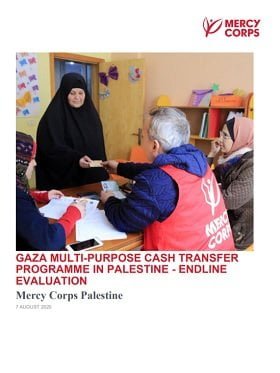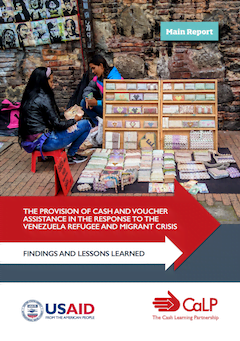Transferts monétaires et mobilité humaine
Les transferts monétaires sont souvent utilisés lors de crises afin de répondre aux besoins des personnes migrantes. Dans cette page, vous trouverez des ressources sur les transferts monétaires et la migration.

La Croix-Rouge se prépare à fournir une aide humanitaire aux migrant·es de la caravane sur le point de quitter le Honduras pour le Guatemala.
©Johannes Chinchilla / FICR.
Conflits, crises économiques et catastrophes sont autant de raisons ayant contraint des personnes à fuir et à traverser des frontières dans des conditions éprouvantes et risquées, en quête de sécurité et de moyens de subsistance. En 2020, le nombre de personnes déplacées de force s’est envolé au niveau sans précédent de plus de 80 millions de personnes, soit près du double du nombre enregistré il y a une dizaine d’année. Cette tendance s’aggrave et les effets du changement climatique menacent de déplacer jusqu’à 200 millions de personnes d’ici 2050.
L’assistance monétaire est de plus en plus utilisée afin de répondre aux besoins des personnes en situation de déplacement. On y a eu recours à grande échelle dans différents contextes de migration, en Europe en 2015 jusqu’au Venezuela pour « los caminantes ». Elle a également été utilisée dans d’autres crises migratoires, notamment en Amérique centrale, au Sahel, en Méditerranée et dans la Corne de l’Afrique. L’assistance monétaire est à l’heure actuelle l’une des principales formes d’aide apportée aux populations déplacées en Ukraine et dans les pays voisins.
Il existe une myriade de perspectives et de définitions concernant le mot « migrant·e » et la façon dont les humanitaires doivent agir. C’est pourquoi nous ne choisissons pas une définition unique pour le moment, étant donné que les discussions sur l’assistance monétaire et la migration en sont encore à leurs prémices et que le langage évolue encore.
Documenter et partager les données probantes donnera lieu à des interventions plus efficaces. Cette page contient une sélection de ressources utiles concernant la migration et le recours à l’assistance monétaire. Elle sera mise à jour au fil des discussions ayant lieu dans les espaces humanitaires des transferts monétaires.
Priorités actuelles
Afin de contribuer aux progrès relatifs à cet enjeu, nous nous engageons à :
- soutenir la création de données probantes aux niveaux régional et mondial ;
- contribuer aux solutions pratiques visant à mettre en œuvre les transferts monétaires auprès des personnes migrantes ;
- organiser des discussions sur les enjeux majeurs basées sur des données probantes.
Contenu récent

SPACE Identifying Practical Options for Linking Humanitarian Assistance and Social Protection in the COVID-19 Response
Guidelines and Tools
This short note examines the relationship between the humanitarian assistance sector and the routine social protection sector in response to COVID-19. Whilst a variety of guidance is being developed to support humanitarian practitioners around the response to the pandemic, less material exists that guides...

SPACE Preparing for Future Shocks: Priority Actions for Social Protection Practitioners in the Wake of COVID-19
Guidelines and Tools
The purpose of this brief is to help social protection actors think through potential options/strategies to strengthen the preparedness of social protection systems to respond to future shocks. The responses to COVID-19 have highlighted the stark limitations of many social protection systems, particularly...

SPACE Social protection for older people during COVID-19 and beyond
Guidelines and Tools
This document provides information and guidance on social protection and older people, with a focus on pensions to cushion the economic impacts of COVID-19. It is intended as an advisory for people involved in planning and delivering social protection support for older people across a range of contexts....

Somalia: Country mapping – Large Scale Cash Transfers for COVID-19 Response
Case Study
This is a rapid country review aiming to identify the best ways to fast-delivery of these cash transfers by: (i) prioritising reasonably actionable measures to channel the available aid towards the most in need, and (ii) identifying a better modus operandi for an articulated humanitarian and development...

SPACE Strengthening Gender Equality and Social Inclusion (GESI) During the Implementation of Social Protection Responses to COVID-19
Guidelines and Tools
The aim of this document is to highlight the key gender equality and social inclusion (GESI) considerations to be considered in the implementation of social protection, with a specific focus on cash transfers, in response to COVID-19. It provides guidance on how to ensure that the delivery of programmes...

SPACE Useful COVID-19 and Social Protection Materials
Guidelines and Tools
This is a living document tracking relevant COVID-19 and Social Protection Materials.

SPACE Social Protection Approaches to COVID-19: Expert advice helpline
Guidelines and Tools
Countries across the globe are using or adapting social protection systems and programmes, including labour market policies and social insurance schemes, as well as humanitarian cash assistance, to respond to the range of immediate and medium-term impacts of COVID-19. Getting assistance to those who need...

Joint Financial Service Providers mapping-Iraq 2020
Report
FSP mapping covering financial infrastructure and the environment in Iraq, FSP`s capacity to current and increased demand, FSPs presence and area coverage, transactions and payment approval process and fees, regulations and required documentations, advantages, disadvantages, challenges, risks and...

Cash Assistance Program For Families Affected by the COVID-19 Pandemic
Report
In March 2020, the Philippines faced one of its toughest challenges yet: the Coronavirus Disease 2019, more popularly known as “COVID-19”. Declared by the World Health Organization (WHO) as a global pandemic, the disease rapidly spread in the months that followed, bringing the confirmed cases to over...

Preguantas De Uso Frecuente
Presentation
PREGUNTAS DE USO FRECUENTE
1. ¿Qué es R4v?
2. ¿Existe un GTM regional para R4V?
3. ¿Por qué es importante tener un GTM?
4. ¿Cómo puedo contactar al Equipo Coordinador? ¿Con qué frecuencia se reúnen? ¿Cómo me puedo suscribir a la lista de difusión? 5. ¿Quién es miembro del GTM Regional?
6....

Frequently Asked Questions
Presentation
FREQUENTLY ASKED QUESTIONS
1. What is the R4v?
2. Is there any Cash Working Group under the R4V?
3. Why is it important?
4. How can I contact the Coordination team? How frequently do members meet? How can I subscribe to the e-mailing list?
5. Who is a member of the RCWG?
6. How does the RCWG link up with...

How to build a Humanitarian Response Plan that makes a difference: tips on accountability and cash
Blog Post
It’s humanitarian planning season once again! The CALP Network’s Sophie Tholstrup and Ground Truth Solutions’ Meg Sattler reflect on how to use the humanitarian planning process to build more effective, people-centred responses.

Livelihood Transition of the ESSN | Capacity Mapping and Understanding the Potential
Report
The Emergency Social Safety Net (ESSN) programme is reaching more than 1.7 million refugees with monthly cash assistance to help them cover their basic needs and providing them with freedom of choice while promoting dignity. On the other hand, the project aims to increase affected people’s economic and...

Community Call: Data Incident Management in CVA
Webinar
Moving away from a walled garden towards a community garden approach.

Adapting to COVID-19 The Use of Cash & Markets in the Red Cross Red Crescent Movement
Members event
TIME: 08:00 am Washington DC/14:00 Geneva/20:00 Kuala Lumpur This online event organized by the Cash Hub will include an update on the Lebanon: Beirut-Port Explosion Cash and Voucher Assistance (CVA) plans and also how CVA has been used in the Myanmar Rakhine Response to COVID-19. Speakers Include: Maysa...

Stepping up CVA with COVID-19: Paving the way we respond to future crisis
Report
COVID-19 has thrown the world into lockdown and taken a tremendous toll on the health, social, and economic status of vulnerable communities, households, and individuals. Limitations on daily activities and an over-arching health crisis, restrictions on movement, closures of schools and businesses have...

Gaza Multi-Purpose Cash Programme: Endline Evaluation
Report
This report presents the key findings of the pilot Gaza Multi-Purpose Cash Program (GMPC) implemented by Mercy Corps Palestine in the Gaza Strip during 2019-20. The aim of the programme was to allow 1,227 poor and food insecure households to meet their varied basic needs, by delivering three cash...

Inclusion of Health Expenditures in the MEB
Guidelines and Tools
Technical note from the Global Health Cluster on methods to include health expenditures in the minimum expenditure basket. The note is meant for cash and cash practitioners alike, working together during the design of the MEB to ensure the health portion is reflected – as it is almost always reported as...

The Provision of Cash and Voucher Assistance in the Response to the Venezuela Refugee and Migrant Crisis: Findings and lessons learned – Main report
Report
This study, for which data was compiled between March and April 2020, seeks to document lessons and good practices in the delivery of CVA in Ecuador and Colombia by humanitarian organisations and governments, in response to migrants and refugees from Venezuela. The purpose of this analysis is...

Use of Foreign Currency for Designing of Assistance Packages in Yemen_Fina
Guidelines and Tools
The Yemeni Rial (YER) during the course of 2020 has shown high levels of volatility in its value against foreign currencies, in particular, the United States Dollar (USD). As program budgets are calculated in USD or EUROs, but cash transfers are made in YER, the reduction in the value of the YER against...